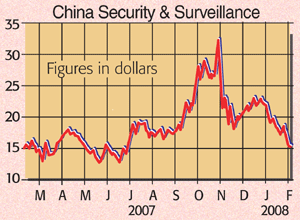
Picture the scene. Beijing 2008. The Olympic torch is alight. The athletes are primed and waiting for the starter’s orders, just ten seconds away from gold medal glory or also-ran failure. The crowds are cheering, while cameras whir, following every move. But it’s not the athletes they’re watching – it’s the crowds.
This year’s Olympics in the Chinese capital will be the most watched in history – and not just by those with tickets to the Bird’s Nest Stadium. China’s security services are rapidly expanding the city’s surveillance and security infrastructure. A full $300m is being spent on security measures at event venues and another $6.5bn on Beijing itself as the city gears up for the August games, reports the Washington-based Security Industry Association.
It seems a lot of money to splurge on one event alone, especially when you consider that the total security bill for the Athens 2004 games came in at about $1.5bn. But then the Greeks were planning solely for two weeks in summer. The Chinese are developing a surveillance network that will last long after the athletes go home.
And it’s not just Beijing. Under the 2006 Safe Cities Programme, the Chinese authorities are rolling out high-tech surveillance systems across 660 cities, planning a massive expansion of CCTV cameras on street corners, in internet cafés and in other public areas. Beijing and Shanghai will eventually house 250,000 to 300,000 cameras; smaller cities will hold around 5,000. That should make it a lot easier to develop a “harmonious society” and combat “hostile elements”, says Hu Jintao, the Communist Party president. According to China’s trade association for surveillance companies, the surveillance market will be worth more than $43.1bn by 2010, up from less than $500m in 2003.
Meanwhile, city residents are being forced to carry more and more personal information on their biometric ID cards, from scans of their fingerprints to details of their reproductive history. China’s 1.3 billion citizens are required to carry national ID cards, which are steadily being changed over to biometric ones with radio frequency identification chips.
And companies have levels of access and freedom to exploit their customers’ personal data in ways that Western firms can only dream of. In comments at Davos this year, the head of telecoms group China Mobile, Wang Jianzhou, said that not only did the group have unlimited data on customers, but it also handed it out when asked. “We can access the information and see where someone is, but we never give this information away… only if the security authorities ask for it.”
There is certainly more than a shade of George Orwell’s 1984 here. But it’s hard for the UK to condemn China’s budding Big Brother society. Londoners alone are watched by over 500,000 CCTV cameras, and the entire British population may well be carrying biometric ID cards within the next few years if the current Labour government gets its way. Indeed, according to a 2007 report by Privacy International, the US and the UK, along with China and Russia, are “endemic surveillance societies” – with Britain home to the world’s largest network of surveillance cameras.
Like it or not, the market for software and products that help to track the movements and personal data of a population is booming. We look at the companies set to benefit below.
The surveillance firms to keep an eye on
One company benefiting from Beijing’s security spending splurge is China Public Security Technology (CPBY.OB). The group, which supplies surveillance technology, particularly GPS, to local governments and businesses across China, is developing residency cards for the city of Shenzen. The cards will be required to prove citizenship and claim government benefits. The stock trades on a forward p/e of 22, which seems reasonable for a rapidly-growing technology stock.
But a better bet might be China Security & Surveillance Technology (US:CSR), on a forward p/e of just 13.8. Based in Shenzen, China, the firm installs, distributes and maintains security and surveillance systems throughout China, and is the standout player in China’s security market, says Smallcapinvestor.com. Through a series of acquisitions, it has emerged as the domestic leader in what is still a highly-fragmented industry. More than half of the company’s sales come from corporate contracts, rather than government ones, but that is changing as the Safe Cities Programme rolls out. Last month it won a $13.78m safe cities contract for Yang City in Guangdong province, and should be in a good position to win more.
Based on conservative assumptions, Lehman Brothers analyst Jeffrey Kessler reckons that China Security & Surveillance Technology, now at $15 a share, should really be trading on $30, “or 28.5 times 2008 estimates and 23.0 times our 2009 estimates.”